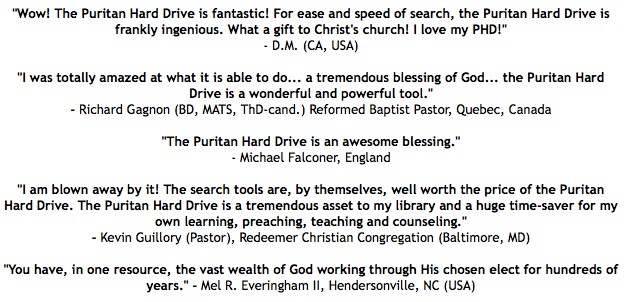 Loading... Please wait...
Loading... Please wait...- SWRB Home
-
Free Resources
- Short Listings Of Free Reformation & Creation Resources
- Free Reformed, Puritan, Covenanter and Creationist Videos
- Thousands of Links to Free Audio, Video and Printed Resources
- Free Puritan Books, Reformed MP3s, and Calvinist Videos
- Puritan Quotes, Free Reformation MP3s, Reformed Books and Calvinist Videos From PuritanDownloads.com On FaceBook
- Shipping & Returns
- Blog
- Privacy Policy
- Contact Us
- Payment Options
- Help
-
About Us
- Sitemap
Pastor Scott Brown, on the left in the video above, is the Director of the National Center for Family-Integrated Churches (NCFIC)
Resource Categories
- PURITAN HARD DRIVE REVIEWS
- PASTOR ROB VENTURA ON THE PURITAN HARD DRIVE
- DR. VODDIE BAUCHAM, JR. ON THE PURITAN HARD DRIVE
- R. C. SPROUL ON SWRB
- DR. JOEL R. BEEKE ON THE PURITAN HARD DRIVE
- PASTOR GREG L. PRICE ON THE PURITAN HARD DRIVE
- DR. MATTHEW MCMAHON ON THE PURITAN HARD DRIVE
- PASTOR SCOTT BROWN ON THE PURITAN HARD DRIVE
- PASTOR W. J. MENCAROW ON THE PURITAN HARD DRIVE
- JOAQUIN FERNANDEZ ON THE PURITAN HARD DRIVE
- PASTOR DAVID SILVERSIDES ON THE PURITAN HARD DRIVE
- JOHN HENDRYX ON THE PURITAN HARD DRIVE
- PASTOR KEVIN GUILLORY ON THE PURITAN HARD DRIVE
- RICHARD BENNETT ON THE PURITAN HARD DRIVE
- DR. KENNY RHODES ON THE PURITAN HARD DRIVE
- JUSTIN RAWSON ON THE PURITAN HARD DRIVE
- PASTOR JAMES WALLACE ON THE PURITAN HARD DRIVE
- PASTOR RICHARD GAGNON ON THE PURITAN HARD DRIVE
- PASTOR JOE HAYNES ON THE PURITAN HARD DRIVE
- DR. STEVEN DILDAY ON THE PURITAN HARD DRIVE
- PASTOR ANDREW COMPTON ON THE PURITAN HARD DRIVE
- TERENCE ELLARD ON THE PURITAN HARD DRIVE
- PASTOR JERRY JOHNSON ON THE PURITAN HARD DRIVE
- PASTOR DAVID PETRIE ON THE PURITAN HARD DRIVE
- JIM DODSON ON THE PURITAN HARD DRIVE
- PASTOR BRIAN SCHWERTLEY ON THE PURITAN HARD DRIVE
- PASTOR PHIL GIBSON ON THE PURITAN HARD DRIVE
- MEL R. EVERINGHAM II ON THE PURITAN HARD DRIVE
- PAUL BLYTH ON THE PURITAN HARD DRIVE
- STEVE KETTLER ON THE PURITAN HARD DRIVE
- D. M. (CALIFORNIA) ON THE PURITAN HARD DRIVE
- MICHAEL CAUGHRAN ON THE PURITAN HARD DRIVE
- WIILIAM NOPPER IV ON THE PURITAN HARD DRIVE
- LINDA THERIAULT ON THE PURITAN HARD DRIVE
- WILLIAM WARNOCK ON THE PURITAN HARD DRIVE
- ROBERT KOH ON THE PURITAN HARD DRIVE
- WHAT'S ON THE PURITAN HARD DRIVE?
- ALL PURITAN HARD DRIVE VIDEOS
- PHD-ODE INSTALLATION VIDEOS
- COMMENTS ON SWRB
- ALL PURITAN QUOTE VIDEOS
- PURITAN HARD DRIVE SCREENSHOTS
- PURITAN HARD DRIVE MINISTRY AND DONATION OFFERS
- TABLE OF RESOURCE CATEGORIES
- Advanced Studies
- SWRB SERMONAUDIO MOBILE APP
- Apologetics
- Assurance
- Attributes and Holiness of God
- Augustine
- Banner of Truth
- Baptism
- Beginners
- Bibles (Geneva, KJV, Hexapla, etc.)
- Biblical Counseling
- BIBLICAL HD COLLECTION
- Biblical Interpretation (Hermeneutics)
- Biographies and Autobiographies
- Calvinism and the Sovereignty of God
- CALVINISM HD COLLECTION
- CALVINIST CLASSICS HD COLLECTION
- Charles Spurgeon
- Children's Books
- CHRISTIAN EDUCATION HD COLLECTION
- Christian History
- Church Government
- Civil Government and Resistance
- CLASSIC CHRISTIAN HD COLLECTION
- Classic Puritan and Reformed Sets
- Commentaries
- Contemporary Issues
- Covenant Theology and Covenanting
- COVENANTER HD COLLECTION
- Covenanters and Covenanted Reformation
- Creation and Creationism
- Creeds, Confessions and Covenants
- Cults, False Religions, Psychology, Humanism
- Dealing with Affliction, Suffering, and Sickness
- Debates
- Dutch Reformed
- Education and Home Schooling
- English Puritans, Covenanters and Reformers
- Family, Children, Home, and Family Worship
- First Reformation
- Five Points of Calvinism (TULIP)
- For Pastors and Elders
- For Seminary Students
- FREE PURITAN & REFORMATION MP3 AUDIO SERMONS/BOOKS
- FREE PURITAN BOOKS, REFORMATION MP3s, PDFs, VIDEOs
- George Gillespie
- God's Law, The Ten Commandments, etc.
- Greg L. Price on Headcoverings
- Heaven, Hell and the Final Judgment
- Holy Days (Lord's Day, Christmas, Easter, etc.)
- HOME SCHOOL HD COLLECTION
- Intermediate Studies
- John Bunyan
- John Calvin
- John Knox
- John Owen
- Jonathan Edwards
- Justification
- Languages, Dictionaries, Reference, etc.
- LOOK WHO LOVES THE PURITAN HARD DRIVE
- Lord's Supper (Communion)
- Marriage, Courtship, etc.
- Martin Luther and Lutheranism
- Martyrs and Persecution
- Other Protestant Works
- Predestination and Providence
- PRESBYTERIAN HD COLLECTION
- Presbyterians and Presbyterianism
- Prophecy, Antichrist, and Eschatology
- PROTESTANT HD COLLECTION
- PSALM SINGING MP3s (COMPLETE SET)
- Psalters, Psalm Singing and Music
- Puritan Facts
- PURITAN FAST SERMONS (1640-1653) - 34 VOLS SET
- Puritan Fast Sermons 1640-1653
- PURITAN HARD DRIVE
- Puritans and Puritanism
- REFORMATION HD COLLECTION
- Reformation History
- Reformed and Puritan Classics
- Reformed Baptist
- REFORMED BAPTIST HD COLLECTION
- REFORMED HD COLLECTION
- REFORMED PRESBYTERIAN HD COLLECTION
- Reformed Presbytery, RPNA Protesters, etc.
- Reformed Theology
- Reformed Worship, The Regulative Principle, etc.
- Roman Catholicism, the Jesuits, Islam, etc.
- Salvation and Evangelism
- Samuel Rutherford
- Sanctification, Prayer and Holiness
- Scottish Covenanters
- Scottish Presbyterianism
- Scripture Song MP3s (Psalms and Bibles Verses)
- Second Reformation
- Separation, Unity, Uniformity, etc.
- Sermons and Sermon Collections
- Solemn League and Covenant
- Theology and Doctrine
- Third Reformation
- Thomas Watson
- Westminster Confession, Assembly and Divines
- Authors (All A to Z)
Phone Orders:
(780) 450-3730
To obtain free Reformation books, Puritan MP3s and Calvinistic videos, SWRB discount coupons, etc., add yourself to SWRB's Puritan and Reformed email list by using the form above.
- Home
- Free Resources
- Free Puritan Books, Reformed MP3s, and Calvinist Videos
- BIRTHDAYS: THE PAGAN AND OCCULT ORIGINS AND THE HIGHEST OF ALL HOLY DAYS (HOLIDAYS) IN THE SATANIC BIBLE
BIRTHDAYS: THE PAGAN AND OCCULT ORIGINS AND THE HIGHEST OF ALL HOLY DAYS (HOLIDAYS) IN THE SATANIC BIBLE
SWRB does not necessarily endorse anything outside or beyond the testimony against the pagan practice of birthday keeping in, or from, any of the information or sources quoted below.
"The highest of all holidays in the Satanic religion is the date of one's own birthday. ... So, the Satanist celebrates his own birthday as the most important holiday of the year." - The Satanic Bible.
"The keeping of birthday records was important in ancient times principally because a birth date was essential for the casting of a horoscope. ... Not surprisingly then, the ancient Jews did not celebrate birthdays, regarding them as Pagan." - Encyclopedia Americana (1991 edition).
"The early Christians did not celebrate His [Christ's] birth because they considered the celebration of anyone's birth to be a pagan custom." - The World Book Encyclopedia.
"Down to the fourth century Christianity rejected the birthday celebration as a pagan custom."
"It is thought that the large-scale celebration of birthdays in Europe began with the cult of Mithras, which originated in Persia but was spread by soldiers throughout the Roman Empire. ... Christmas is also relevant because December 25th was the day of celebration of the birthday of the sun-god Mithra."
"Originally, even as more and more Gentiles began to profess Christ (so much so that they outnumbered those of Jewish heritage that did), the early Gentile leaders also did not endorse the celebration of birthdays. No early church writer endorsed the observance of birthdays by Christians, nor are they ever listed in the early observances of the Christian church. ... No early religious/church writing from the second century that I have seen (and I have read most that are available) seems to endorse (or even suggest) the celebration of birthdays by any who professed Christ. ... Origen, glancing perhaps at the discreditable imperial Natalitia, asserts (in Lev. Hom. viii in Migne, P.G., XII, 495) that in the Scriptures sinners alone, not saints, celebrate their birthday" (Martindale C., Christmas, 1908).
"Christmas is coming! Quite so: but what is "Christmas?" Does not the very term itself denote it's source - "Christ-mass." Thus it is of Roman origin, brought over from paganism. But, says someone, Christmas is the time when we commemorate the Savior's birth. It is? And WHO authorized such commemoration? Certainly God did not. The Redeemer bade His disciples "remember" Him in His death, but there is not a word in scripture, from Genesis to Revelation, which tells us to celebrate His birth. Moreover, who knows when, in what month, He was born? The Bible is silent thereon. It is without reason that the only "birthday" commemorations mentioned in God's Word are Pharaoh's (Gen. 40:20) and Herod's (Matt. 14:6)? Is this recorded "for our learning?" If so, have we prayerfully taken it to heart?" - A.W. Pink, Xmas (Christ-mass).
In the free MP3 "Demon Possession (1 of 3) in Early America,"(above) you will hear how the demons consider Christ-mass a very special (unholy) day. On one occasion, the particular demons is this account even instructed a person who wanted to make formal covenant with them (and ultimately, Satan) to wait especially for Christmas day to transact this great wickedness. This example is at about the 8:50 to 9:50 point on this MP3. A second historic example, where the demons desired to keep Christmas with one they oppressed, can be heard in the free MP3 "Demon Possession (2 of 3) in Early America" (also above). This second example can be heard from 20:20 to 21:20 on this MP3. Below is a portion of what can be heard on these MP3s.
Sect. XXX. After this, we had no more such entertainments. The Demons it may be would once or twice in a Week trouble her for a few minutes with perhaps a twisting and a twinkling of her eyes, or a certain Cough which did seem to be more than ordinary. Moreover, Both she at my house, and her Sister at home, at the time which they call Christmas, were by the Demons made very drunk, though they had no strong Drink (as we are fully sure) to make them so. When she began to feel her self thus drunk, she complain'd, "O they say they will have me to keep Christmas with them! They will disgrace me when they can do nothing else! " And immediately the Ridiculous Behaviours of one drunk were with a wonderful exactness represented in her Speaking, and Reeling, and Spewing, and anon Sleeping, till she was well again. But the Vexations of the Children otherwise abated continually. They first came to be always Quiet, unless upon Provocations. Then they got Liberty to work, but not to read: then further on, to read, but not aloud, at last they were wholly delivered; and for many Weeks remained so (Cotton Mather, Memorable Providences, Relating to Witchcrafts and Possessions (1689).
Satan loves his demon-inspired, man-made holy days, and this is a clear example of one of the ways in which devils come as "angels of light" (2 Corinthians 11:14), feigning unscriptural religiosity to deceive the ignorant and scandalous. When the church has been at her strongest these Papist/Pagan/demonic holy-days (Christmass, Easter, etc.) have been matters of discipline, as noted in the free online quotes at https://www.puritandownloads.com/christmas-is-a-roman-catholic-missions-strategy/ and at https://www.swrb.com/newslett/freebook/holyday.htm.
These quotes also demonstrate that civil sanctions, in accord with Scripture, have at times also been enacted. For example, it was for this very reason that in Calvin's Geneva you could have been fined or imprisoned for celebrating Christmas. It was at the request of the Westminster Assembly that the English Parliament in 1644 passed an act forbidding the observance of Christmas, calling it a heathen holiday. In an appendix to their 'Directory for the Public Worship of God' the Westminster divines said: 'There is no day commanded in scripture to be kept holy under the gospel but the Lord's day, which is the Christian Sabbath. Festival days, vulgarly called 'Holy-days', having no warrant in the word of God, are not to be continued.' (See also, James Bannerman, The Church of Christ, Vol. I, pages 406-420). When the Puritans came to America they passed similar laws. The early New Englanders worked steadily through December 25, 1620, in studied neglect of the day. About 40 years later the General Court of Massachusetts decreed punishment for those who kept the season: '...anyone who is found observing, by abstinence from labor, feasting, or any other way, any such days as Christmas Day, shall pay for every such offense five shillings'" - Is Christmas Christian?
Christ's Power Over Demons (Mark #23) by Greg Price (Free MP3)
Paul Blyth Reviews and Recommends the Puritan Hard Drive
BIRTHDAYS: THE PAGAN AND OCCULT ORIGINS AND THE HIGHEST OF ALL HOLY DAYS (HOLIDAYS) IN THE SATANIC BIBLE
VIDEO INTRODUCTION TO THE PURITAN HARD DRIVE


Phone Orders:
(780) 450-3730
To obtain free Reformation books, Puritan MP3s and Calvinistic videos, SWRB discount coupons, etc., add yourself to SWRB's Puritan and Reformed email list by using the form above.
Current Top Sellers
-
1
-
2Puritan Hard Drive - On Demand Edition for Windows
$2,897.97$597.97 -
3Puritan Hard Drive - On Demand Edition for Mac
$2,897.97$597.97 -
4
-
5
































